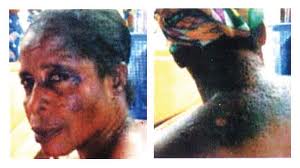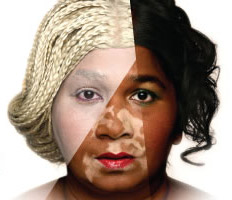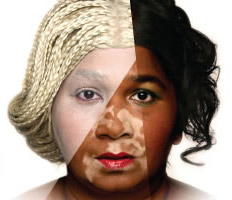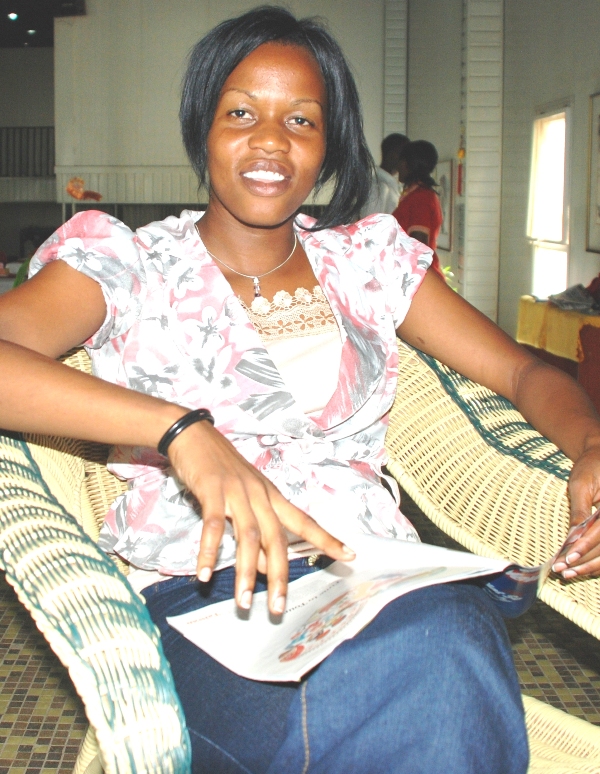The more one bleaches the uglier one becomes because you become 50 percent light, 50 percent dark — Fanta and Coca Cola (lighter on the face, darker on the legs.

ASANTEWAA LO LIYONG
Columnist



My closest friend is about to go for her traditional wedding. The family is pressuring her to ‘beautify’ herself, because she is, after all, an ‘Arosa’ (bride) and they should be princesses on their wedding days.
This definition of beauty means they must be light, Arab-white or Kawaja white.
They have told her that she is not a real bride because she’s still with her dark natural skin.
Is this the bride, some asked? Why does she look like this (dark, natural)?
I told her that should she even attempt it for that one day I will disown her.
Her fiancé backed me.
They wanted her to bleach for her wedding day only, (one day?).
What happens to the wedding photos and how do you explain to friends that the light skinned woman on the pictures is actually you?
I’ve seen numerous photos at some houses where a photograph shows the husband with a light, almost white-skinned woman and then, the following day, the wife appears and she bears no resemblance to the woman in the picture.
Pressure? Racism? Caving to bullying? People bleach for all sorts of reasons.
A LEGACY OF SLAVERY
From India, to Mali,, China to Sudan, South Africa to Congo, Pakistan to Senegal: it’s bleaching every day, every hour. It’s the legacy of slavery and colonization. Lighter skin or white people received all the privileges over hundreds of years. The lighter you are the higher your status socially and economically.
In some places, the lighter you are, its perceived the more successful you are or the more beautiful you are. Marketers and advertisers do not make the situation easy, they portray messages that state the lighter you are the prettier you are and handsome you are. They are also aware of the impact a black or white face on package can have on sales.
DIVERSITY BETTERS THE WORLD
We were all born different for a reason. Diversity makes the world a better place.
Our complexions were made so by God for a good reason, due to climate, environment, and possibly our food. Darker skin is best suited for hot and humid climates while lighter skin is suited for cold weather.
Many skin lightening creams are imported from countries where regulations are not enforced and have a high mercury and hydroquinone content.
Mercury is known to cause poisoning that leads to kidney failure.
Hydroquinone lights the skin color by killing the melanin, destroying the top layer of the skin that protects us against the sun rays, putting us to risk of cancer, and causing ochronosis, in which the skin becomes darker and thicker, with dome-shaped yellowish spots and grayish-brown spots. After discontinuing skin lightening creams, the skin becomes darker than its original colour.
Some women and men become psychologically addicted to the creams. Creams don’t only destroy the complexions but also self-esteem.
Why some someone would go to such extremes to be “beautiful” – a relative thing.
Aren’t we all beautiful in need of accepting the way God made us confident and learning that if God didn’t know what he was doing he would have made us different.?
FUELING LOW ESTIMATE
Skin bleaching can be done by injection, pill, creams, and surgery.
Hair salons in South Sudan are even providing injections to women to bleach themselves.
With no government regulations in the market, anybody can become a dermatologist, which is rather dangerous.
The original or medical use of lightening creams was to treat conditions such as freckles, dark spots, hyperpigmentation, melasma, acne spots, and skin discoloration.
However, it has been turned into a self ‘beautification’, and fuels the souls of people with low self-esteem.
Sadly no matter how much you change the outside if you don’t change the inside you are still the same. The more one bleaches the uglier one becomes because you become 50 percent light, 50 percent dark — Fanta and Coca Cola (lighter on the face, darker on the legs).
The irony is that ‘black’ people go to bleach while ‘white’ people go to suntan to become darker.
WHY? OH, WHY?
Why should I bleach my skin if tomorrow my children will still be born black?
Why should I bleach my skin and walk around smelling like a dead animal and get sun burnt.
Why would I risk my health and get skin cancer or other skin diseases for the sake of beauty?
I am who I am and God made me beautiful despite my complexion and if people’s acceptance depends on my skin complexion so be it.
So, to bleach or not to bleach? I posed the question to fellow countrymen and women?
Kiden 28
Hating the skin you’re born with so much that you would rather put it off. Its denying your true identity, your light your mother and father are black and your children.
Bianca 28
It should be done away with, its not good, it destroys peoples skins, and they look ugly. The dark skin helps you from the heat but when you bleach your skin is not protected. Cosmetics sold in the market should be regulated, they bring the products and don’t inform of them of the risks, in their country they work well but here because there is no information they take chances.
Awareness campaigns need to be done to inform people of the products their using the good and the bad.
Winny 27
Should be discouraged and its going against nature. People should appreciate how God created them. It has a lot of consequences, such as skin diseases. Its taking off your first layer of skin.
Agok 31
I hate it.
Nyakur 28
It’s a sense of insecurity, thinking they will become beautiful.




